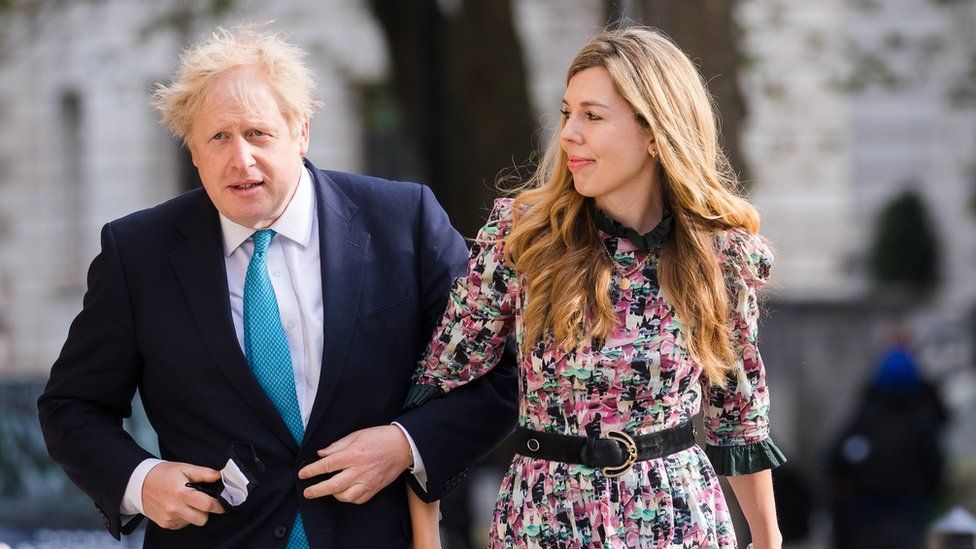The government’s respect for rules for MPs has been called into question, following its handling of the case of former minister Owen Paterson.
No 10 initially backed overhauling the rules - and blocking his suspension - before performing a U-turn. Mr Paterson - who denies wrongdoing - has resigned as an MP.
The Conservatives and Boris Johnson are facing a number of investigations.
Downing Street flat
Boris Johnson has faced questions over how the refurbishment of his Downing Street flat was paid for.
Conservative Party accounts revealed that over £50,000 of the costs were met by Tory donor Lord Brownlow, after the PM reached the limit of the annual £30,000 budget for upkeep.
Lord Brownlow’s contribution was described as a “bridging loan” by the party, which paid him back in full.
But investigations continue.
The Electoral Commission: Ongoing
The watchdog is examining whether the Conservative Party breached laws on political finance.
It follows claims the costs of the flat refurbishment could have been initially covered by undeclared donations.
Under the rules, parties have to report donations to the commission if they are above a certain amount. The party said it believes all reportable donations were correctly declared.
The commission has powers to require parties, and any relevant individuals, to hand over documents and attend interviews.
It can issue fines of up to £20,000 or even refer the matter to the police.
Lord Geidt: Concluded
Mr Johnson asked his newly-appointed adviser on ministerial standards, Lord Geidt, to look into the “facts surrounding” the flat revamp.
He was supported by Simon Case, the cabinet secretary, who had also been asked to look into the matter.
Lord Geidt concluded the PM had not broken the ministerial code, but had acted “unwisely” by not being more “rigorous” in finding out who funded the refurbishment work.
Lord Geidt said a Tory donor had paid an invoice for some of the costs.
Jennifer Arcuri
Mr Johnson has faced questions about his relationship with American businesswoman Jennifer Arcuri while he was London Mayor between 2008 and 2016.
Ms Arcuri received public grants for her technology business and event sponsorship, and had access to three foreign trade missions led by Mr Johnson.
She has since claimed to have had an intimate relationship with Mr Johnson, raising questions about conflicts of interest. Mr Johnson has always denied wrongdoing.
London Assembly investigation: Ongoing
In September the assembly heard evidence from Ms Arcuri, who said members of Boris Johnson’s staff knew he had a “crush” on her when he was mayor.
Labour assembly member Len Duvall said the committee would look at Mr Johnson’s conduct, including whether he adhered to the “principles of public life”.
Any finding that Mr Johnson acted improperly could be politically damaging and embarrassing. But as he is no longer mayor, the assembly will not be able to impose any sanctions or question him further.
Separately, the Independent Office for Police Conduct (IOPC) said last year it would not carry out a criminal investigation into Boris Johnson’s dealings with Ms Arcuri.
Greensill Capital
A row about lobbying began after it emerged former Conservative prime minister David Cameron contacted ministers and officials via text messages, on behalf of collapsed finance firm Greensill Capital.
The company’s founder worked as an unpaid adviser to Mr Cameron during his time in Downing Street.
Mr Cameron has insisted he did not break any rules, but acknowledged it would be better for ex-PMs to communicate more formally with government figures, through letters rather than texts.
The Boardman Review: Under consideration
Boris Johnson announced a review into government decisions involving Greensill, led by lawyer Nigel Boardman.
It examined the relationship between the firm and current and former ministers.
The first part of the review, published in July, said Mr Greensill’s Downing Street role gave him a “marketing platform” for his business.
It also said Mr Cameron “understated” the nature of his relationship with Greensill Capital. However it concluded he “did not breach the current lobbying rules and his actions were not unlawful”.
The second part, published in September, outlined 19 recommendations, including legally binding restrictions on the work former ministers and senior civil servants can take. It said those engaged in lobbying should formally register.
The government is yet to respond to the review, which is not legally binding.
Other Parliamentary inquiries
Three Commons select committees launched inquiries into Greensill:
- The Treasury Committee said the Treasury should have encouraged Mr Cameron into more formal lines of communication
- An interim report from the Public Administration and Constitutional Affairs Committee found no apparent conflicts of interest in Mr Greensill’s relationship with the government. It will now review Mr Boardman’s reports
- The Public Accounts Committee has examined evidence about Greensill Capital’s involvement in government Covid loan schemes and is expected to publish a report in November
- The independent advisory Committee on Standards in Public Life said “the current system of transparency around lobbying is not fit for purpose”
- The National Audit Office found “no evidence” that ministers or senior civil servants considered potential conflicts of interest with Greensill Capital before awarding public sector contracts
David Cameron insisted his lobbying for Greensill was in the public interest, but also revealed he was paid “far more” by the finance firm than he was as PM, during appearances before the Treasury committee and the Public Accounts committee.
Mustique holiday: Concluded
An investigation how Mr Johnson’s 2019 holiday to the Caribbean was paid for ended earlier this year.
Carphone Warehouse owner David Ross invited the prime minister and then-fiancée Carrie Symonds to the private island of Mustique.
Parliamentary Standards Commissioner Kathryn Stone said the prime minister broke the rules by not having “fulfilled conscientiously” the requirements to register donations.
But her decision was overturned by a parliamentary committee. It said it was “regrettable” a full explanation had not come earlier.
BJ’s no Trump but I can’t recall any UK other PM having such a dubious personal financial history … ![]()






